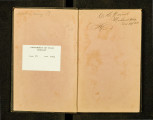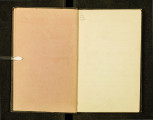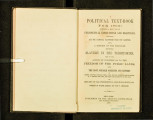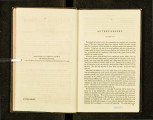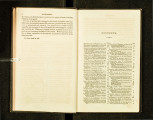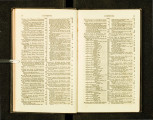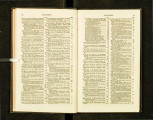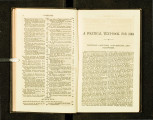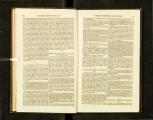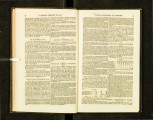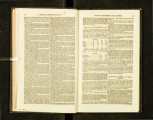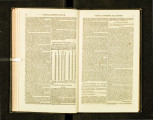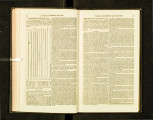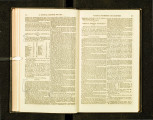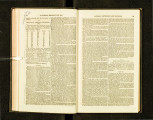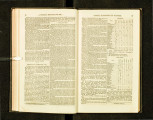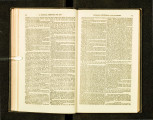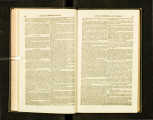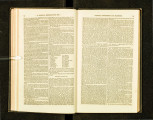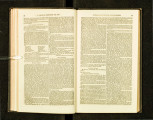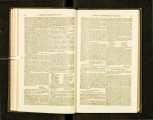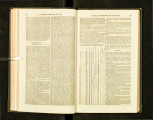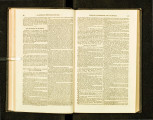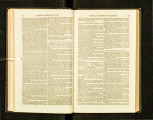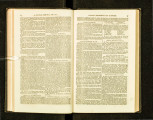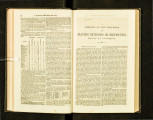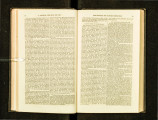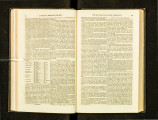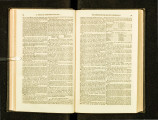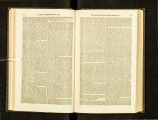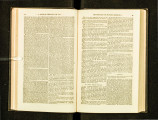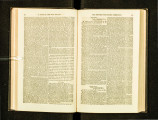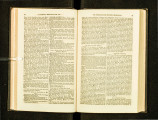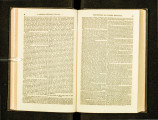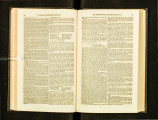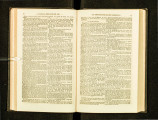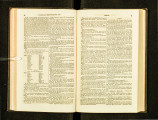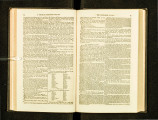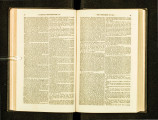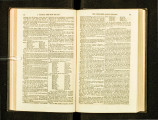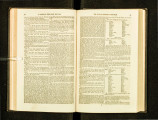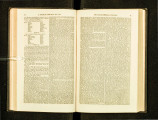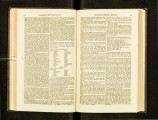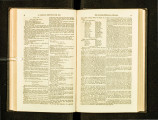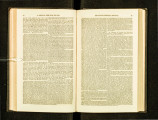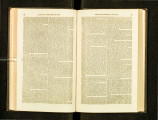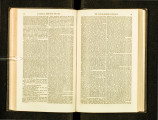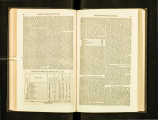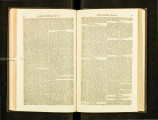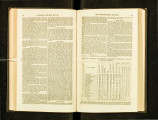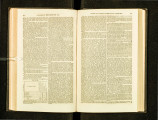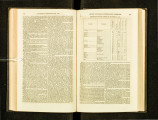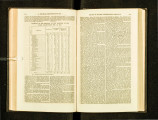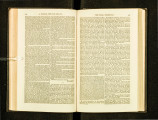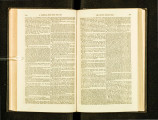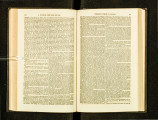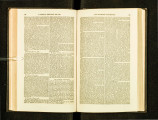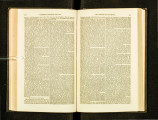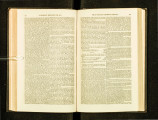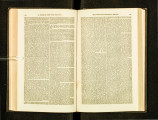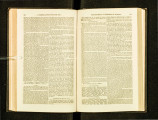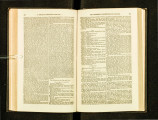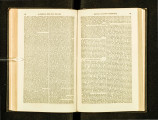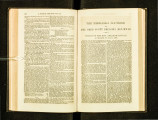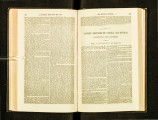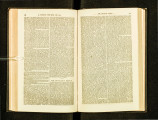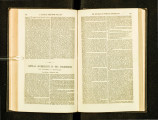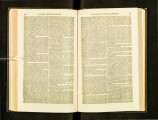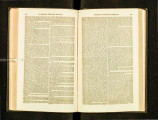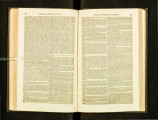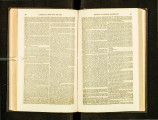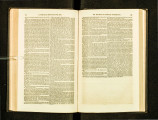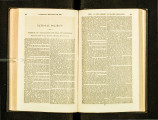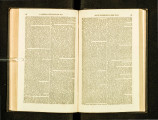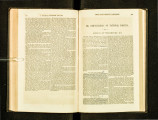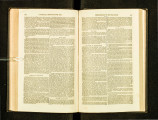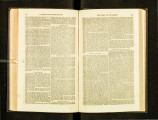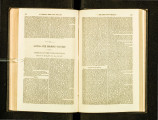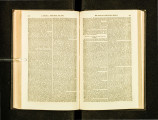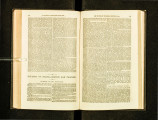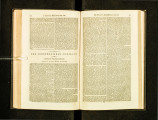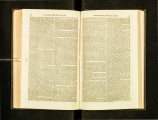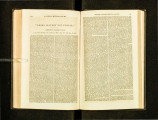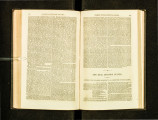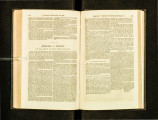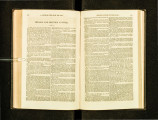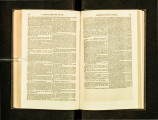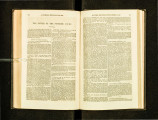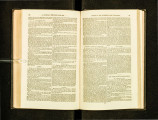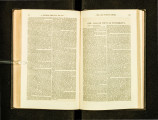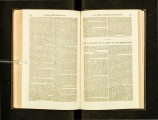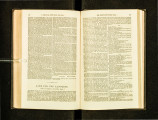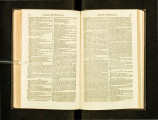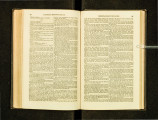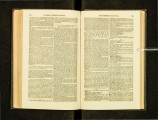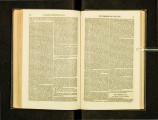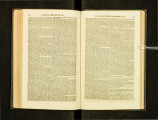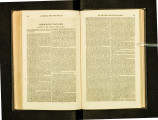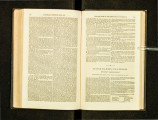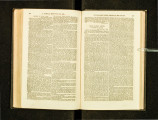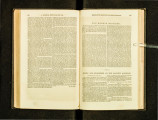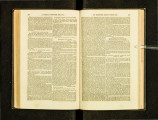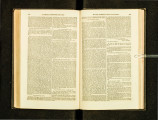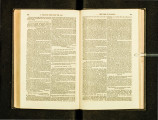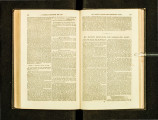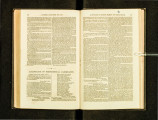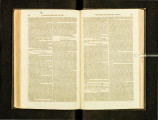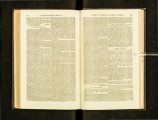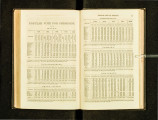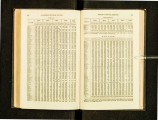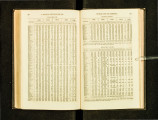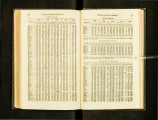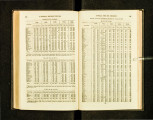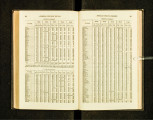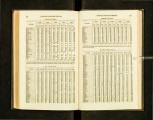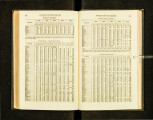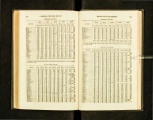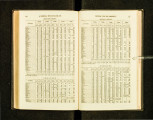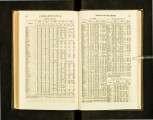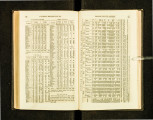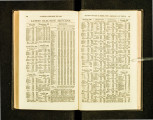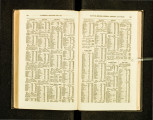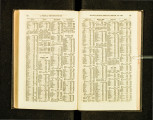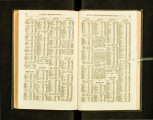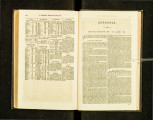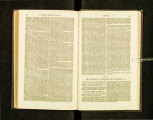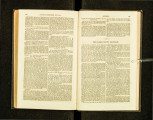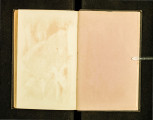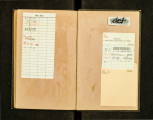| OCR Text |
Show ) us A rotr'l'ICAL TF.XT-DOOK FOR 1860. such ri~~1t is nffi••metl ill the instrument by implication, IL would be open to othcrH to show that neither the word "slave" nor "::lltLVery" is to IJe found in the Co n ~titli· ti o n, nor the word ·'prop erty" cvon, in any connect ion witll t.hc language nlluding to the thinb"l! lll:tve, or 'l:n 'ci'Yl and that wherever in that ln~trum c nt the ~lave is alludct to, he is called a "person i" and where'lcr hL~ m:l:>ter ·s kgnl right in r elation to him Is alludod to, it is spoken of as "service or labor due,'' ll!l t\ "debt" paya iJle iu Rcrvice or labor. Also, it would be open to ~ h o w, by contemp oraneous hbto ry, that this mod e of allulling to slave::~ and Silwery, instead of 3peaklng of them, wa:~ cuploy eJ on purpo~c to cxcluue from the Co us tllutiou the iuea that there could be t>roperty It: man. To show all this is easy and certain. When this ob'llous mistako of the Judges shall be brought to thdr n otice, IL ill not r easonable to expect that th ey will wlthdmw the mistaken statemen t , nud roconsiuer the conclusion based upon It? And th en it is to be remembc•·cd that ·' our f11.thcr·s, who framed the Govcmment under which we live" - the men who m:tde the Co n~titutio n ·- decided this same Con tituUonal question in our favor, long ago - dcddcu it wi thout a divis ion among themselves, when making the u ccision; witho ut divis ion among thcrmclves about the meaning of it a ft er it was maLic, and so f:u· as any e viuence is loft, wit.hout l.Jasing it upon any mistaken s tat ement of f11cts. Under all th c~c circumstances, do y on r eally feel your:1clvcs justitictl to break up this Oo I'Cr:rmcnt, unless s uch ~L court <lecision as y our:! i~; sha ll be at o nce submltteu to as a conclusi vc and tlnul rule of p olitical action? Dut y ou will not abide the election of n ltcpublican President In that suppO:!t•d event, you 1:1ay, you will d estroy the Union; and th en, y ou say , the great crime of having destroyed it will be upon us? l'hat is cool. A highwayman holds a pistol lo my car, and mut tct·s th rough hi:1 teeth, "stand anti d e liv er or I shall kill you, and th en you will be a murde er !" ' '1'o be sure, what the rohbcr d emanded o f me-my !lloney~was rny own ; and 1 had a c lear right to keep 1t; but 1t was no mrlrc 1uy own than my vote is my own ; and the threat of d ea th to me to extort my money :1. 11 tl the tlu·cat of destru ction t o the l!nion, to extor~ my vo te, can sc:Lrcely be d b tin gu i~ h cd in pr·inci pl e. A. fe1v word3 now to Jtepub!ican:;. It is ex cccd ingi.Y des1mi.Jie that all p:l r ts of th 1 ~ great Confed eracy s hall IJc at peace, and in harm ony , o ne with anoth er. Let u~ Jtepublicans clo our part to have it so. J•: vcn though much provoked, let u ~ <lo noth ing thro ugh passion and Ill t c111 per . . l•:vcn Lh uugh the ~ ou th em people will n ot so much as hstcn to us, let us c almly consid et· th eir d e rn :uH1~, a nd yielu to th em if, in our d elib erat e view of our duty, wo po::ss .h!Y <·an. Judijinc; hy all th ey sa.v and d? , and by tltc sub; ~ct and nat u r:~ of th eir contrOI'C!'l:ly wtth u , let us d eternunc, 1f we can, what will sat isfy them? Will lh~y b~ :!atl:t tied if tl •e '1\: rrito n es l>e unconditio nally ~u r rer Hl c rt: d to the•n? We know lht•y \Till not. ln all tlrc~ r presc~ll· c nrnpl:d nt ~ again:.t u ~, thu l'e r ri torie.i a re ~c1u·cc1 y me ntiOII <:tl. l nva,lons and iu s urrccti o n~ a rc the rag<J u uw. \VIII it a tb ly th c111 1f1 in thc futur~ we have no thing to do Wlt.h in V:L,io iiS and i n surrecti ~ns ? We kn ow It will not. \\'e ~o kn ow het·ansu we kno 1v we never hat! a ny thing to tlo w1 th i nva ~io n s and insurrections · and ye t this total u.l,:s tai1t.ing d ues HOt cx ~: mpt us from th~ charge and the d c iiU IICIUti on. 'L'he qn e~ Li o n r ecurs, what will sali fy them ? Simply ~h i s: We 1nu s ~ not o nly lut Ll> c lll alon e, b ut we mus t, 11omehow, con v•ncc thc111 that we do let them al one. This we lw?w IJy cxpe.l'ience . is nu ca~y ta~ lc. We have h ee 1~ liO try111g ~ 0 COIIVlnCe lhem, fr0111 lhC Vt: f'y be"inning Ot' <lUI' o rgtllll~au o n, bnt With no s uece:ll:l. ln ali our platforms !l lll l llpceche!l we have t:onst :l lllly protCd l t:tl our purpo~ e .to lt::L th em alo r~c ; but t1 11~ haa had no t enden cy to COII\' Ince th em. Al1ke uuavailing to convince them i~ the f:~ct that tl11!y hav ~ ll t:Yer tl etc~o::~:d a lll lln of ~in any att cmpt Lo uisturll lln:m. 1\!le30 n~LturaJ, and apparently adeqUate means &11 fan ing, what will convince t hem? 'l'his, aiH.I this onl . ct;fL~e tu call Sl~l very wro"g, and j oin them in cnllin/i1 t ' L(Jht. Anti tl11::1 must be t.l one th oro ughly - <lunu in act, lli lf.:ll :1:1 111 word11. Silence will not be tolc ra t~:1t-we lllll~t pl:.l :c our:;ul Yes llVOI\'Cdly With th ~m . Douglas's ~ t c w scd1t1on law IIIU:It be enactetl a nd en forcccl, suppresi- 111); all d .:clar:ltiunl:l lhat Slavery is wro1Jg, whether 111au in pullt ic:~, in p rel!scs, lu pulpits , or in pnvate. We mus~ arrc:~ t and ret uru their fugiti vc sl tt Vl'S wit), grccu pl e a s ure. Wt: 111u ~ t. pull u own our Jf ree Sta te COIJstit utionl1l. The whu!e. atmo."phcre must be d is in fec te1l from all tainl of o pp 11~ 1t10n t•> Slavery, before they will cease to believe tha.t all th eir trt~nbh·s proceed from us. , 1 :L.III quite awaru th~:y <.lo not state their e a~e precisely 111 thl:i way. 1\l ost of· them woulu proba bly ~ uy to us " Lt: t u~ alo ne, 1lo no thing t.o us, urHI say what you pleM~ a~>uu t $1 :lvt:ry." But we tlo let th em alon c--havo never d •sturbetl lll c iii-SO that, a fter all, It is what we sny which dissat b f1es Lhe 111. They will contiuue to a ccuse u~ of d oi n:;, u nl II we cc a::~e saying. I an• al :~o u.w :u·l! th ey ha ve not, as yet in terms d emanded the o ve rth row of our l!'rec Sta te co'nstitutions' Yet those constiwtions decla re the wrong of Slnvcry with more solemn e1nphasis, t ha.n do a ll o ther aaying; against it; aud when all these oth e r sayings ~ hall have bt:cn si lenced , the o ve r throw of these constit utions will he <i e lllllnd cd, nn1l no th ing be left to r esist the ucmnnd It I~ nothing Lt) the co nt rary , that they lio not demand th~ whole of Lids ju~t now. Dcmantl ing what they do, and fur the rc a:-~o n th ey (io, they c a u volun tarily !topnowhere ~ h o rt of th is commmn1ation. lloldinl(, :.s they do, thnt Slavery 1!:! morally r ight, anti socially c ie vtlting, they can· not Ct:<~se t.o d em:Lnd a full rmtio n al r ecognition of It 113 a legal nght, and a !inc ial bl es sing. ' Nor can we j u~ tifl ;lhly withhold tills, on nny grountl ~:l vo.: our con vi.:th)U 1 hat ::lla very is wrong. Ir tllal'ery Is n ~-:h t, a ll w o rd :~ , a c t~ , laws , and cons ti t uti on ngainsLit, arc thc u1scl vcs wrong, and sh ould be s ilunceu, a nti swcpl a way. J f it i:1 n ght. we can uot j u~ tly obj ect to its nl)tion· a lil y - i111 Ulliycr,-alll y ; if it is wrong, th ey cannnt justly in s is! upon it:1 •·xl er ls lon-its e nla rgen1ent. AllthtJy nsk, we could r e.u llly ~r an t , if we th ought 'lavery right ; all we a~k, th ey could as r ead ily graut , if they thought II wru ng. 'J'hdr th inking it r ight, and our t hi nk ing 11 IH <• u g~ is the precise fa ct upon which tl c pe n <l ~ th ~: \Yiloia t:ontro ver sy . 'l'h iukinglt right, as they do, they are nol t11 blnlllc for tle~ inn g itl:l full r ecog n it ion, t\S bei ng rlghl ; hut1 think i n ~ it wrong, as we d o, can we yield to th ~m? Ua n lfe c ast our vo tos with their view, a nd a g:ti nijt ou1 own? In view of our 1110nLl, s ocitli, a nd politicaltesptHI· si hili t ics, can we do thi:J ? Wrt)l)g a~ we think !::!lavery is, we can yet a lford to let it alone who.: re it is, b ccau e that much is due to the n ece~si ty ari:11ng from Its a ctual presence in the nution ; but ca11 Wt· , willie our votes will p re ven t it, allow it to spread int u the National Territor it:s, a nti to ov~ rrun us he r t: in the<~e .!<'reo States f lf our sc n ~o of l.i11ty fo rbids this, then let us stnncl by our duty, fo.:arlessly and e lfectlvcly. Let us be diverted hy n one ot those sophistical contrivances wher ewith we aro so i ndu ~ trl o usly pl iccl anti belabo t·ctl-con trivauces such as g roping for some midule ground between the right ami the wrung, vain us the search fo t· a wan who should bo neither a liv ing man n or a deau man-such as a policy uf" d ()n't care" on o. question a bout \Vhich LLll tru.: men do care-such a!l Union appeals beseeching true Union men to yield to Disunionist!!, reversing the Llivluc rule, allLI calling, not the sinners, but the ri ghteous to repentance-- such as In vocations to Washington, i111ploring men to unsny what WtJ.:!lliugton saitl, a nd u uuo what Washing· LOll uid. Ne ither let us be sla.nd er ecl fr om our duty !Jy fnl~e accu ·ati ous a gainst us, n or frig hten eel rrorn it by menaces of de~tru c tion to th ~ Gov ~: nrm e nt, n or of dnng~t>ns to oursdves. Let us have 'ait\1 that r ight makes might, and in that faith, let us, tG '.ht! tntl 1 tlar~ to do our uuty, .S we understaud IL. DRED SCOTT-MISSOD RI COMPROMISE. }lR. BHECKINitiDGl~ ON NATIONAL l)OLITICS. --···-- '~ PE~ Oll AT l!"'RANKFOR'l\ IrY. THE It o:-~. J o liN C. lltn:cKtN ttLDO ~: d 'Ji ,·crcu the f'ollowiu rr Kpcc<.:h on t he ~ •n ·ral political topic. of Lhc ~l ay u ' fore liH• L Pgi ·ltttlln! of K~lltuckv at Frankfor t. in D ~c. 18;>H. Mr. llr~c~onrili< rl! had bt•en n•~.:e ntl y clt'<.:tcu to the Unt t.cd ~t:~cK ~~· 11ate, lly the K cn w~.:ky Lcgi.la ~nr.c; nnd :tft r reLttrniug his th;wks fo r the dl:-~l mgui" hed honor, and promi::ling to ~c rv c ~ h e • 't a te to LllC l ll' i-IL of l1it~ aiJ iliLy, h ~\tw.A.l--tts fol+ews : 'The elccLiou took p lace on !\Ion <lay. 'f he day b e fore I 1eccive<l a IdLer Higned by a number or gentlemen in the Legi~l.u. u rc, as k i n~ u1y opinion in r efe rence to the U1ow :'COl r d.:c.sion, in reference to 'l'er rito rial Sover eignty aut! the power o f Con gre~s to p ro I cct the p roperty or ci ti~erw within the 'l'erritori ~s . 1 received that Jetter with profound re~pt:~· t, and ouly regret it d.id not come t-o my h and~ in tin•c, that l might answer 1t before tho oicction. U11t yet l al!l ~lad that I co uld not iUiswcr it before th:Lt d:ty, for y our c ho ice h; a sor t of indo1 scment or my souu luc:;s u pon those questiotts. I confess l was s.Hu~:: wlmt !!mtiucd that t he e lection took pl ac ~ be fore 1 ha.l tho~e (J lle:.tio ns to a nswer. lt was u t t erly unp~sslI. Jh: fur nte 1 o have r c t.ume tl an a nswer before th e t11ne fi xed IJy your law fur UlC e lectio n, but, I n e v e~ iutcnrled to fail in tliit~ aw;wer. I never should 111we fatle<l. Had it hccn one who sig ned it, instead of twenty , the r esult wo uld IHtve been precisely the same. Hc~itles this it would hn ve been of b ut little consequence, lie th~ answer be fore or after . I be long to that scliool of po litics tha t belie ves in im;t•:uction, .nud whenever l 1un not ready to r e ceive the 1nstruct10ns of t l.te bta tc, l t~tau d ready to give back the trust confided 111 rny hauds. ,/ Tin: D n ~: D SCOTT D ~:CISfO N. ~ GQDI)r>~l l bow tQ tJw_d~~lsion.o.f.th_e.SU,pr~e..Coll...t ~~ 1a ~ upQn e very uestion .wit hin Its pr.opcr j urisuictiou, whethe r it ccnTes sJo n a~:~ w1th my pr}va. te opi.nlon or n ot · o nly I b ow a. trifle lower when tt hlW.UIYUUo uo so, ns' the d bcision in tho Drcrl Scott c1tse d~. I Jlpprove it in all It:~ p <t rtS n~; a ~;ountl exposition of the l1tw and constitutional r igh ts of the States, and t.:itlzcns that in htLbit them. (Appla use.) It ~my n ot ~ e improper fot· me here to add thtLt so grc1~t an tnt c rest d 1d 1 take in tluLt d ecision and in its p ri n ci ple~ b eing s ustained ancl undcr:~too ~l in the commonwealth of K entucky tha.t [ took the trouble a t my own cost, t o p rint or hu've prinll•d a l:Lrgc ecliti ~n of that d ecision to. sca tter it over the 'LtLtc , and unless the mail,; have m•s.carricd, there Is ~:~carcc ly a memuer e lected to the Lcgll! la.ture who has not r eceived a copy with my frank. 'l'o approve the d ~:cisi o n of the Supreme Court In ~h e Dreu 'cot t case would seem to settle the whole qnest 10n ol •ren-ito ria l ~o ~ e •·eignty as I think will p r esent ly a ppett. r i but, 1n o rll c t· th•~L no o ne may misunden tnnd 111y views on that question, I will. wi th y our leav e, li eNUn you wi th o. b r ief r e view of what was done as to the Slavl!ry qnesLion up to the time o r that d ecision, r e ferring alwo to the tlutie1:1 imposed by it. Till<; MIS~O U RI LI N!<:. pealed, a nd we passe<.! the act knr,\Vn as the I\nnsa!rr.chmska bill. 'l'he Abolition, or qttalii Abolition Jl!Lrty or the United States were constantly contendlnl{ tha t it was the r ight of Congress to prohliJit Sla vt• ry iu the common 'l'l!rritorles of the Union. '!'he Democratic p:lrt.r, aided by most of the gentlemen from the ~o uth, took the opposite view of the case. Our obj ect was, if p os~ib l e , to withdraw that question from the Ha lls of UonJ:ircss, aud pla ce l~ where lt coulrl no longer rb;k tile public welfa re uutl the public inte rest. ln the Congre~s of the Uuited ::ltn tcs it had been agitated a ll the ti1ne, to the cli:mdvuntage of the 'outh · a ccordingly ( l have 110t n copy of the IJill he fore me no~v but I rcmemuer lts leading pro1•islons ), 1\ bill \\ ai p assed, 'repealing the Ml:-~ ·ouri li ue, and lcavi11g those 'l'erritoric.' S upon the contmct and the a~~ e r tion th a t the bill made. Did we intend hy It to legisla te Slavery inlo l(a nsas and Nebraska? We denied t hnt, a nd denied it upou the face of t he hill Itself. 'l'he settl ·m •nt tlllls ma de, afterward received the approval of the people of tile wholt· count ry. 'J'he bill said within Itself, not tli a t we intcn u t.o legislate Slavery into the 'J'errl tories1 hut t? leave the 1~eo· p le free to fo•·rn their own domeilt•c lm;l ltutlons, suhJt:et only to the Constit ution of the Ur1ited 'tate~ . 'l'hat was as much as we cou lu agree upon. 'l'here was a point u pou which we could not agree. A consldcm l>le 1~ortion of ~h e North ern Democracy held that Ia v_cry was rn tl crol(:~L~on of common right, and coult.l only cxt~t h:Y fo r.ce of !J lllllLJvc la w. 'l'hey conten1lcd that. the UonstttulJon d11l n o~ furu\;;h that law and th;Lt the slav •holtler could not go 1n to t ht• 'l'crritori~s with hb~ siJtvcs with the Constitution to auth,orizc him in holding his slaves as property, or to p rotect huu. 'J' hc Sou th genera lly without d i~tiucUon of part y, heltl the opposlte ~iew. 'J'h cy held that the ci ~izcns of all the States may go with wh;\tever was rccoglllzcd by the Constitution as p rop erty, an ti enjoy it. 'J'hat <lid not seem to be uenle<l to a ny artic le of pnJperty e:- ccpt sla vcs. AcconJin gly t he bill contained the provision, that any (\UC8- tion ln reference to lavery shonl!l be r eferred to the court of t he nited 'tates, and the u nderstanding was, tlm~ what ever the j udicia l dcci~ion should IJe, it would be bmd.U.g u pon a ll parties, not only by .v~ rtue of the agreement, bu\ under the ob li~atlon of the c1t1zens to r espect the a uthority of the legally constituted courts of the country. WllAT lH: SAID JN 185(). It was under th ese ci rcumstan ces, while the Territory of Kansas was in a st.ate or commotion, a nd when tllat quetltion had not been uetermlned by t he courts, t hut the canvass of 1 5G c1une on. lt became my uuty, by th? r equest of my friend!!, to vlRit the Stut c1:1 of (~hio, Jndtana, l\lichi an aucl Pennsylvania. In a ll those lutes l made , f s l n all those States I utt.crc<l the same oplnioll.l ~l~~~~~~l~rcd the same p rinciples tha t 1 have ever done in Lhe commonwealth of Kentucky , ami am ready to do a.ga.W.. None other I · t r u t has been charged that the Democrat ic par Yo re co~ntry and particula rly of the South, clesircu to employ tl Fcd~ral Governrucnt for the purpo~e o: propagatln~ s:: vcr and slave legislation In the 'J.'crn torrc~. 1 denied t h·\t t lrc Dl!rnocra tlc p:"Lrty desired to usc the l•et.l eral Oov- ~mcnt for the propagation of Sllwer.v, aud J n: ver conc~ d 11 what we bclievetl to he our constltutlt~n ;d. ng-ht to lt:s ce c . l what the decision of the i;:ulH cmc CoUJ ~ prot ectiOn, a n< • our rl rht I sa id- yes! I did say liHLt the has allow~d to ~cty of tl~is 'country In Its federal aspect, l)~:moc•rilal ttc p tuP ro-ShLvery nor nn 'A ntl•- ~I l\VeJ. j. y..u · ty , b ~~ t l ~liS in...!.lle C..Q.nj,[[W_ or tlre United States when that ~Ouril\ne Wtl !l r(;p eale\1. cevte~e~:--v~ YO&ed for Aey bill organiz i n~ the T crrltMy o · · ~~~lt ()dlous stigm·t u pon our in:~li tutlo n!! i'ema1n d upon the tta!.~ok . I voLuu •Jheerfully for Its r epe •~l, 1\nd 1n tluing that l cast no rdlectlon upon tho wi!le pntrio t~ who ac\jwcsce<l iu it a t the time il was establlihcJ . It wail r e · was ne, )e~ 11 • nd r r epeat lt here to-ml-:ht. (A p-i\ const1tuttonal p,trtyll tl 't 1 1 •lo not believe that the 1·1 a l15~·1) OIo vdeor unmote nllet weavse o 1r gsa.n lzcc'l for either purpose, but e e~~tect the rights a rlj udicalerl by the courts. All to P , to the tt\tes thernsell·es . th;~e belon~ the decla ra tions that 1 malle, of which some. r hesbe wetbeeeu heard In all the Sta tes. I made tho thiog a.s |



